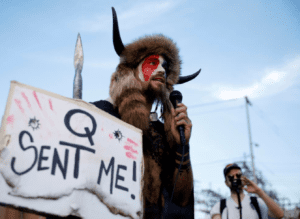From the old times, jumping about 70 years into the future, into interwar Germany, a far more potent, destructive and single-minded wave of radicalization was sweeping the nation. The roughly 20 years of peace were not good times for Germany. It had been humiliated in the first World War, with Kaiser Wilhelm II forced to abdicate and revolution was strife. Radical organizations flared up like weeds and covered the political spectrum.
Although most of them flamed out just as quickly, one that stuck was the National Socialist Worker’s Party, which we know today as the Nazi Party. In brief, they were a group of nationalist, white supremacist and anti-communist people who were masters at effectively wielding propaganda and rhetoric. While in retrospect we might find their actions and words inexcusable, the humiliation of the war and subsequent Treaty of Versailles, along with a non-existent economy and weak political systems certainly, gave them the excuse needed to spout their right-wing views, and as election results at the time showed, they were wildly successful. They were so successful that the Nazis (allegedly) burnt down the Reichstag and used it to their advantage. That allowed Hitler to pressure President Hindenburg into giving him near-total control of Germany to the mass persecution of Jews and other minorities, outlawing all opposition, all the core pillars of an authoritarian regime’s “how-to” manual, ending with Germany’s surrender in May 1945. While the Nazi Party only existed for about 20-ish years, the consequences of its rise to power have been massive and visible even in the modern-day, and is history’s prime example of what can happen should a radical, specifically alt-right group gain control over a nation’s power structures. Whether we heeded that lesson, only time will tell. Not much more to say here, we all know how this part goes.
Where does that leave us today? While Germany has become stable and pragmatic over time, it has had to grapple with radicalization in recent years, from both the far-left and far-right. They have had to face threats, as a new form not experienced in Germany before: militant Islamist terrorist groups such as ISIS or Al-Qaeda. Before the last half-decade, terrorist attacks and radical organizations were few, but attacks have increased in frequency ever since, even entering the Bundestag through the Alternative for Germany (AfD) political party, the first time in postwar Germany that a right-wing group has entered Parliament. Germany has proved to be the hotbed for political radicalization within Europe and has housed more extremist groups overall than any other European country, a troubling fact given what we know about modern German history, and especially interesting since Angela Merkel announced an open border policy for migrants and refugees in 2015. From a van attack in early 2017 to the murder of a pro-immigrant politician in 2019, Germany is no stranger to organized, devastating terrorist attacks provoked primarily by the alt-right or Islamist militants.
One interesting differentiator is that while most of the attacks by ISIS agents seem to follow a “lone-wolf” blueprint, alt-right attacks seem far more centralized, organized and planned, with various instances of right-wing extremism being detected within the German army and police forces themselves, and their numbers seem to grow by the year. Although a counter-radicalism federal bureau has been established recently, many experts fear it is too little too late. However, there is hope, however slight, that this trend may be dying down, as counter-terrorism efforts grow ever more effective, and AfD results during the 2021 elections were a mere shadow of what they were in 2017. But Germany should know better than anyone, not to rest on their laurels when it comes to tackling radicalization in politics, especially that which leads to violence. It has had too much experience over the last two centuries with the matter to pretend that it is a new phenomenon or that it doesn’t know what must be done, and we can only hope they can rise to the challenge, to safeguard Germany’s and by extension Europe’s collective futures.
References
Matters, History, director. German Unification & Empire. History Matters, 22 Feb. 2017, https://youtube.com/watch?v=47lA4xvovaE&feature=share
Matters, History, director. The Weimar Republic & Nazi Germany. History Matters, 25 Oct. 2016, https://youtube.com/watch?v=vO-_HXO7HwY&feature=share
“Nazi Germany.” Sparknotes, SparkNotes, https://www.sparknotes.com/history/european/interwaryears/section10/
“Unification of Germany.” Wikipedia, Wikimedia Foundation, 31 Oct. 2021, https://en.wikipedia.org/wiki/Unification_of_Germany#German_revolutions_of_1848_and_the_Frankfurt_Parliament
Jordans, Frank. “Rise in Far-Right Extremists Seen in Germany Last Year.” AP NEWS, Associated Press, 15 June 2021, https://apnews.com/article/government-and-politics-europe-germany-health-coronavirus-pandemic-04551f4764b68747c30ad33f9f6c4903
Hockenos, Paul. “For Germany, Far-Right Extremism Is a Problem from Hell.” For Germany, Far-Right Extremism Is a Problem From Hell, World Politics Review, 26 Oct. 2021, https://www.worldpoliticsreview.com/articles/30068/for-germany-far-right-extremism-is-a-problem-from-hell
(www.dw.com), Deutsche Welle. “9/11: 20 Years on, Germany Still Grapples with Militant Islamists: DW: 11.09.2021.” DW.COM, DW, 11 Sept. 2021, https://www.dw.com/en/9-11-20-years-on-germany-still-grapples-with-militant-islamists/a-59077260






